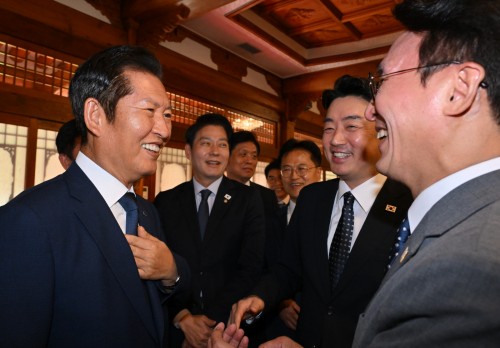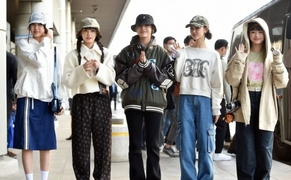 |
| Democratic Party leader Chung Cheong-rae (left), Prime Minister Kim Min-seok (right), and Presidential Chief of Staff Kang Hoon-sik talk ahead of a high-level policy meeting at the prime minister’s residence in Samcheong-dong, Seoul, on August 10. / Source: Song Ui-joo |
One week after taking office, Democratic Party of Korea (DPK) leader Chung Cheong-rae has moved swiftly to project strong leadership, handling key issues decisively and positioning himself as a “reform-driven” party chief. His bold approach is drawing attention for its potential impact on President Lee Jae-myung’s administration and the ruling bloc.
Since his August 2 inauguration, Chung has accelerated the party’s reform agenda, swiftly approving task forces on prosecutorial, media, and judicial reforms, and finalizing leadership appointments.
He has acted firmly on internal controversies. When allegations surfaced that Rep. Lee Chun-seok engaged in stock transactions under borrowed names, Chung ordered an ethics probe and, within a day, decided to expel him — the party’s most severe penalty. The rare move against a four-term veteran lawmaker underscored Chung’s determination to enforce discipline. Even after Lee quit the party voluntarily, Chung’s expulsion decision appeared aimed at preempting criticism of a mere “symbolic sacrifice.”
Chung also tapped six-term lawmaker Choo Mi-ae to head the powerful Legislation and Judiciary Committee, placing the most senior member of the National Assembly in a position usually reserved for three-term lawmakers.
He has tightened party discipline, warning members after several lawmakers from the Gwangju–South Jeolla region skipped an on-site Supreme Council meeting on August 8, instructing the secretary-general to investigate their absences. Some lawmakers later issued public explanations on social media.
Breaking with political tradition, Chung has not paid courtesy visits to rival parties such as the People Power Party (PPP) or the New Reform Party. Instead, he has met with smaller progressive parties, including the Rebuilding Korea Party, Progressive Party, Basic Income Party, and Social Democratic Party. Criticizing the PPP over the alleged “illegal martial law conspiracy,” he said, “You shake hands with people, not with those behind such acts.”
Chung has also courted the DPK’s core base — party members and voters in the Honam region. The day after taking office, he visited Naju, South Jeolla Province, to join flood recovery efforts. His first on-site Supreme Council meeting was also held in Honam, where he called the region “the sacred ground of democracy and the heart of the DPK.” Key appointments have favored Honam lawmakers, such as Rep. Seo Sam-seok as a nominated Supreme Council member and Rep. Kwon Hyang-yeop as party spokesperson.
Chung has also pledged to amend party rules to abolish the current system that gives different voting weights to delegates and rank-and-file members, calling it unconstitutional.
Political analyst Park Sang-byeong described Chung’s strong stance as “appropriate,” saying it suits the DPK’s push for the Lee administration’s reform agenda. Concerns over bipartisanship, he argued, could be addressed through a “two-track” approach in which the floor leader handles negotiations while the party leadership maintains a firm stance.
Most Read
-
1
-
2
-
3
-
4
-
5
-
6
-
7





















